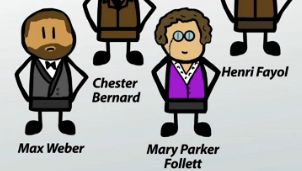Classical Administrative School of Management: Managing the Organization
After you watch the video and know the material, click HERE for the quiz.
Even if a business knows what each of their individual workers ought to be doing, there may not be any overarching mission guiding their work. This lesson describes how the need to consider an entire organization by emphasizing management principles led to the development of the classical administrative school of management.
The New Guy in Town
As the idea of systematic management grew in popularity, so did the amount of people who were interested in defining and improving the practice. People like Max Weber, Henri Fayol, Mary Parker Follett, and Chester Bernard were among the theorists who sought an alternative, more general approach from the highly specialized functions of scientific management. Whereas scientific management concentrated on the productivity of the individual worker, administrative management focused on management processes and principles of the entire organization. Essentially, the goal of management theory shifted from concern for precise work methods to the development of managerial principles. Thus, classical administrative management was born.
 |
Not Just a Concept, but a Profession
Stay-at-home moms have long made the argument that what they do is, in fact, a job, even though there are no benefits, salary, or paid days off. On any given day a stay-at-home mom can be a cook, a chauffeur, a doctor, a hairdresser, a psychologist, a cheerleader, a maid, a secretary, a teacher, a daycare provider, a financial advisor, and the list goes on and on. Still, many people think what they do is not a job at all. This is exactly what management was regarded as: just something that people do. But that was all about to change.
The administrative theorists tackled the idea of management from many angles with the common goal of designating it as a profession that could be universally taught and applied in organizations everywhere. Using personal experience, Weber, Fayol, Follett, and Bernard researched and developed a broad spectrum of topics, including things such as:
- organizational principles
- the philosophy of management
- clarification of business terms and concepts relating to management
- social responsibilities of management
- functional responsibilities of management
- organizational structure
- leadership, power, and authority
 |
Specific contributions by individuals will be discussed in other lessons of this course. However, even without the specific descriptions of each individual contributor of administrative management, we can begin to see how management was quickly becoming a legitimate force in organizations. For Weber, Fayol, Follett, and Bernard, management was a profession in the same way as law, medicine, and science were. It was through their life's work that management was suddenly becoming a legitimate, and necessary, field of study.
Putting It All Together and Building on One Another
While scientific management provided managers with the best way for individual jobs to be done, administrative management focused on the best way to pull all those jobs together and organize a business. Put simply, scientific management was concerned with the parts, and administrative management focused on the sum. It's much like how a cook needs to consider the most appropriate ingredients to include in his recipe (scientific management) so that his vision of the final product becomes a reality once he completes the cooking process (administrative management). Administrative management essentially provided the manual, so to speak for, how to effectively operate the entire organization, or, for the case of the cook, how to pull together all of the individual ingredients so that the final product comes out as anticipated. How a company should be organized, who should have authority over others, determining who does what work and why, and understanding and nurturing the employee/manager relationship were detailed out for managers, helping them to not only understand their jobs better but to be more effective at them.
 |
Lesson Summary
Let's review. Administrative management was developed out of the desire to establish management as a profession that focused on the organization and operation of a business. Management theorists such as Max Weber, Henri Fayol, Mary Parker Follett, and Chester Bernard were instrumental in developing the principles and practices of administrative management. Each of these contributions will be discussed in other lessons of this course, but in general, their focus was on things such as:
- Organizational principles
- the philosophy of management
- clarification of business terms and concepts relating to management
- social responsibilities of management
- functional responsibilities of management
- organizational structure
- leadership, power, and authority
When compared to scientific management, which was concerned with the best way for individual jobs to be done, administrative management offered a more general approach that focused on management processes and principles of an entire organization.